The Cambridge History of China. Vol. 06. Alien Regimes and Border States, 907-1368
Подождите немного. Документ загружается.

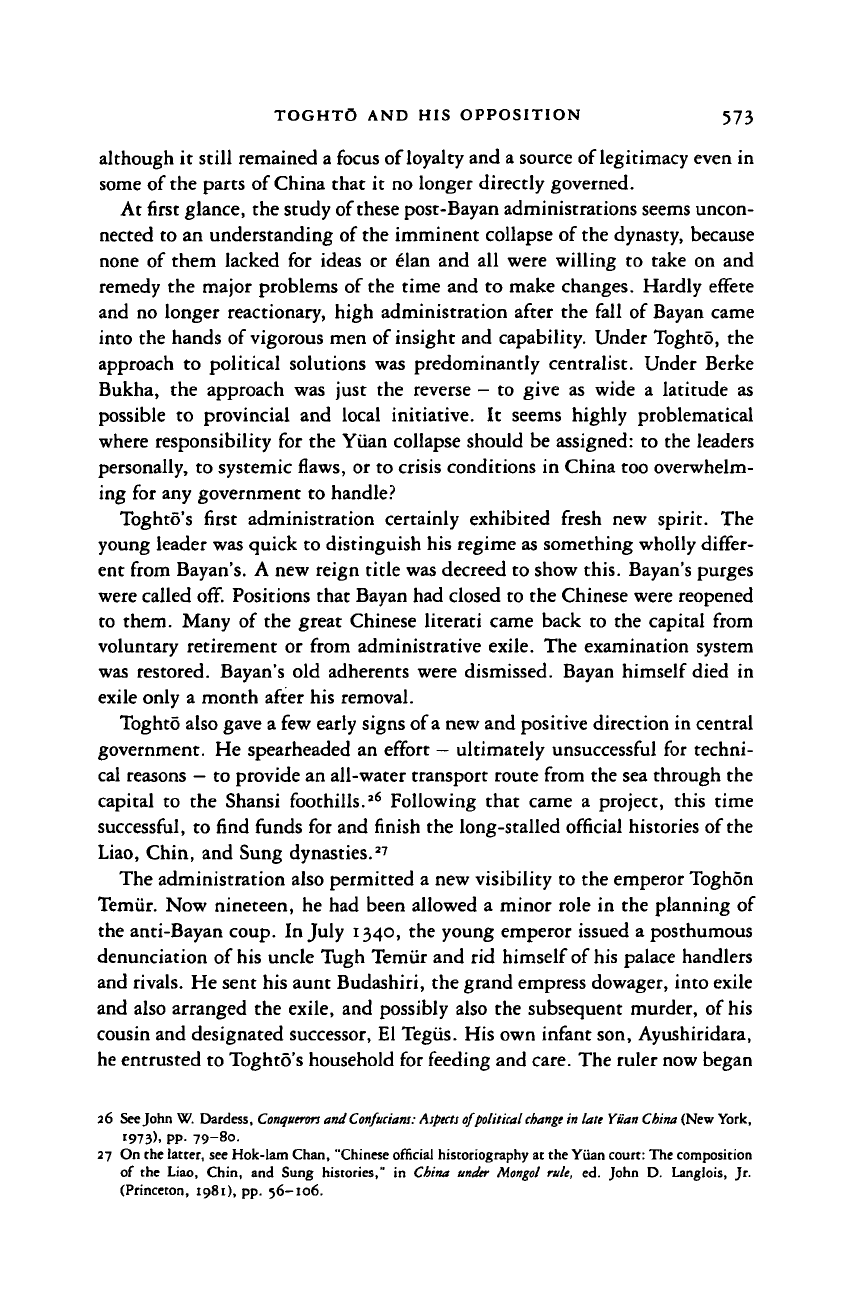
TOGHTO AND HIS OPPOSITION 573
although it still remained a focus of loyalty and a source of legitimacy even in
some of the parts of China that it no longer directly governed.
At first glance, the study of these post-Bayan administrations seems uncon-
nected to an understanding of the imminent collapse of the dynasty, because
none of them lacked for ideas or elan and all were willing to take on and
remedy the major problems of the time and to make changes. Hardly effete
and no longer reactionary, high administration after the fall of Bayan came
into the hands of vigorous men of insight and capability. Under Toghto, the
approach to political solutions was predominantly centralist. Under Berke
Bukha, the approach was just the reverse - to give as wide a latitude as
possible to provincial and local initiative. It seems highly problematical
where responsibility for the Yuan collapse should be assigned: to the leaders
personally, to systemic flaws, or to crisis conditions in China too overwhelm-
ing for any government to handle?
Toghto's first administration certainly exhibited fresh new spirit. The
young leader was quick to distinguish his regime as something wholly differ-
ent from Bayan's. A new reign title was decreed to show this. Bayan's purges
were called off. Positions that Bayan had closed to the Chinese were reopened
to them. Many of the great Chinese literati came back to the capital from
voluntary retirement or from administrative exile. The examination system
was restored. Bayan's old adherents were dismissed. Bayan himself died in
exile only a month after his removal.
Toghto also gave a few early signs of
a
new and positive direction in central
government. He spearheaded an effort - ultimately unsuccessful for techni-
cal reasons - to provide an all-water transport route from the sea through the
capital to the Shansi foothills.
26
Following that came a project, this time
successful, to find funds for and finish the long-stalled official histories of the
Liao,
Chin, and Sung dynasties.
27
The administration also permitted a new visibility to the emperor Toghon
Temiir. Now nineteen, he had been allowed a minor role in the planning of
the anti-Bayan coup. In July 1340, the young emperor issued a posthumous
denunciation of his uncle Tugh Temiir and rid himself of his palace handlers
and rivals. He sent his aunt Budashiri, the grand empress dowager, into exile
and also arranged the exile, and possibly also the subsequent murder, of his
cousin and designated successor, El Tegiis. His own infant son, Ayushiridara,
he entrusted to Toghto's household for feeding and care. The ruler now began
26
See
John W. Dardess,
Conquerors
and
Confucians:
Aspects
of political
change
in late Yuan China (New York,
1973).
PP- 79-8o.
27 On the latter, see Hok-lam Chan, "Chinese official historiography at the Yuan court: The composition
of the Liao, Chin, and Sung histories," in China under Mongol rule, ed. John D. Langlois, Jr.
(Princeton, 1981), pp. 56—106.
Cambridge Histories Online © Cambridge University Press, 2008
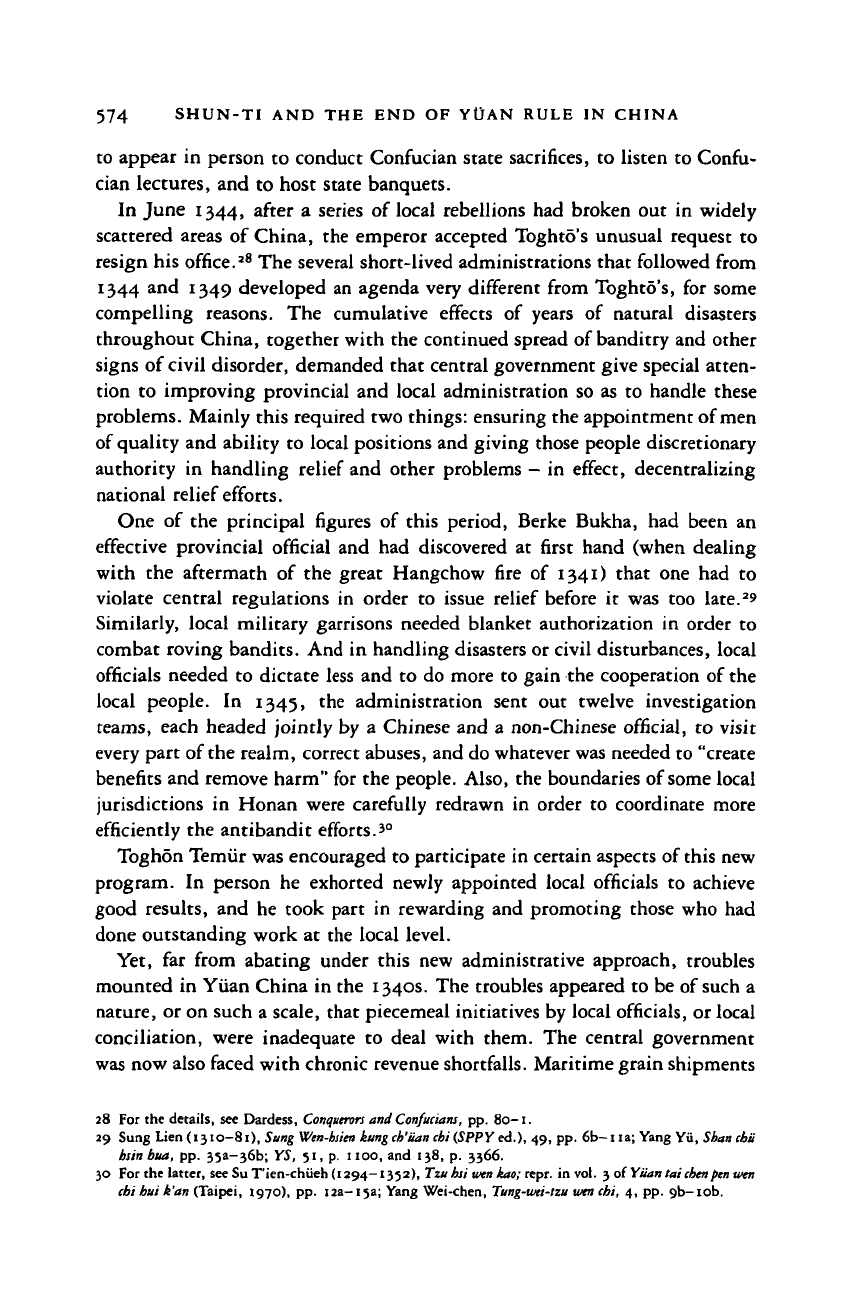
574 SHUN-TI AND THE END OF YtJAN RULE IN CHINA
to appear in person to conduct Confucian state sacrifices, to listen to Confu-
cian lectures, and to host state banquets.
In June 1344, after a series of local rebellions had broken out in widely
scattered areas of China, the emperor accepted Toghto's unusual request to
resign his office.
28
The several short-lived administrations that followed from
1344 and 1349 developed an agenda very different from Toghto's, for some
compelling reasons. The cumulative effects of years of natural disasters
throughout China, together with the continued spread of banditry and other
signs of civil disorder, demanded that central government give special atten-
tion to improving provincial and local administration so as to handle these
problems. Mainly this required two things: ensuring the appointment of men
of quality and ability to local positions and giving those people discretionary
authority in handling relief and other problems - in effect, decentralizing
national relief efforts.
One of the principal figures of this period, Berke Bukha, had been an
effective provincial official and had discovered at first hand (when dealing
with the aftermath of the great Hangchow fire of 1341) that one had to
violate central regulations in order to issue relief before it was too late.
2
*
Similarly, local military garrisons needed blanket authorization in order to
combat roving bandits. And in handling disasters or civil disturbances, local
officials needed to dictate less and to do more to gain the cooperation of the
local people. In 1345, the administration sent out twelve investigation
teams,
each headed jointly by a Chinese and a non-Chinese official, to visit
every part of
the
realm, correct abuses, and do whatever was needed to "create
benefits and remove harm" for the people. Also, the boundaries of
some
local
jurisdictions in Honan were carefully redrawn in order to coordinate more
efficiently the antibandit efforts.
30
Toghon Temiir was encouraged to participate in certain aspects of this new
program. In person he exhorted newly appointed local officials to achieve
good results, and he took part in rewarding and promoting those who had
done outstanding work at the local level.
Yet, far from abating under this new administrative approach, troubles
mounted in Yuan China in the 1340s. The troubles appeared to be of such a
nature, or on such a scale, that piecemeal initiatives by local officials, or local
conciliation, were inadequate to deal with them. The central government
was now also faced with chronic revenue shortfalls. Maritime grain shipments
28 For the details, see Dardcss,
Conquerors
and
Confucians,
pp. 80-1.
29 Sung Lien (1310-81), Sung
Wen-bsien
kung
ch'iian
cbi (SPPY ed.), 49, pp. 6b-na; Yang Yu, Shanchii
bsinbua, pp. 35a~36b; YS, 51, p. 1100, and 138, p. 3366.
30 For the latter, see SuT'ien-chiieh (1294—1352), Tzu hsi
wen
kao; repr. in vol. 3 ofYuan tai
then pen
wen
cbi bui k'an (Taipei, 1970), pp.
12a—
15a; Yang Wei-chen, Tung-wei-tzu wen chi, 4, pp. 9b-iob.
Cambridge Histories Online © Cambridge University Press, 2008
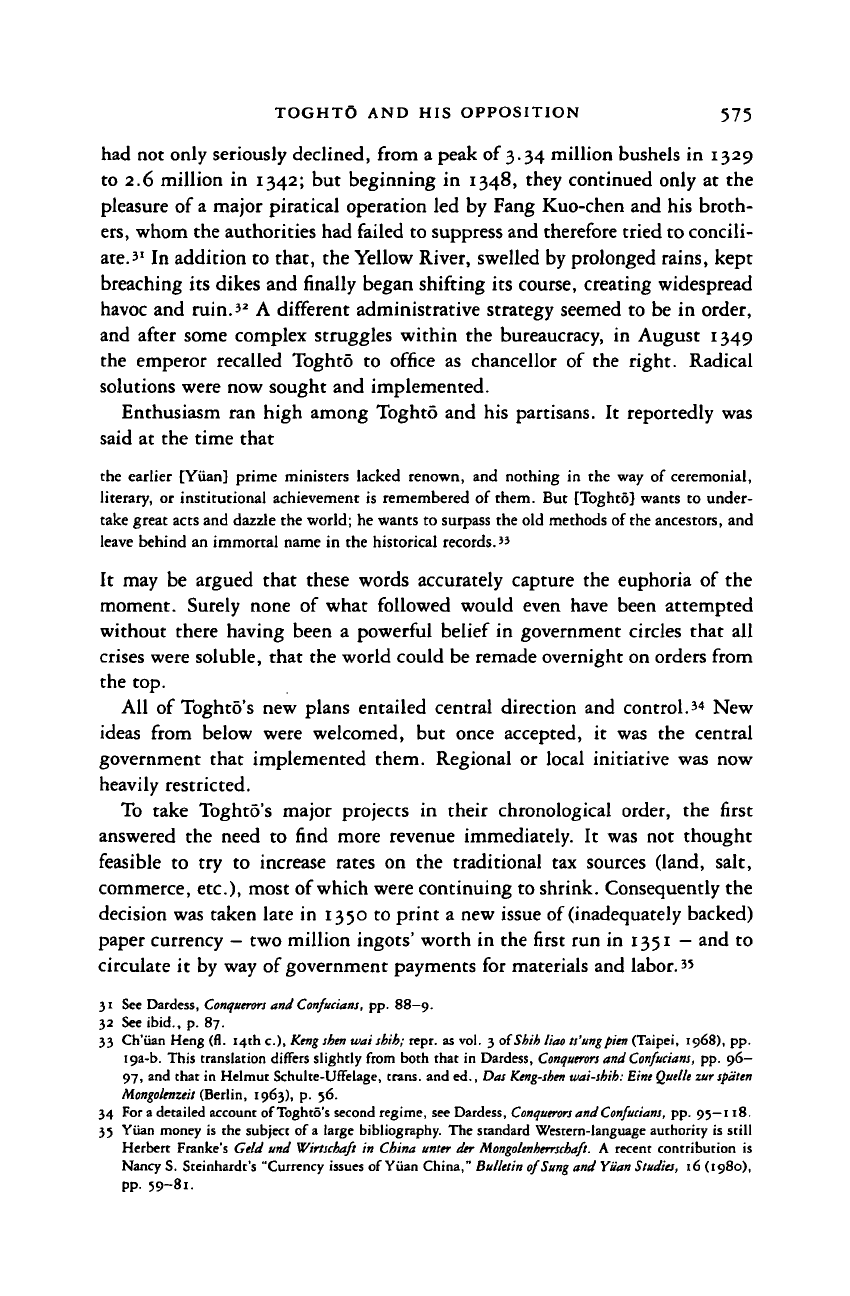
TOGHTO
AND HIS
OPPOSITION
575
had not only seriously declined, from a peak of 3.34 million bushels
in
1329
to
2.6
million
in
1342;
but
beginning
in
1348, they continued only
at the
pleasure
of
a
major piratical operation led by Fang Kuo-chen and his broth-
ers,
whom the authorities had failed to suppress and therefore tried to concili-
ate.
31
In addition to that, the Yellow River, swelled by prolonged rains, kept
breaching its dikes and finally began shifting its course, creating widespread
havoc and ruin.
32
A
different administrative strategy seemed
to be in
order,
and after some complex struggles within
the
bureaucracy,
in
August
1349
the emperor recalled Toghto
to
office
as
chancellor
of the
right. Radical
solutions were now sought and implemented.
Enthusiasm
ran
high among Toghto
and his
partisans.
It
reportedly was
said
at
the time that
the earlier [Yuan] prime ministers lacked renown, and nothing in the way of ceremonial,
literary, or institutional achievement is remembered of them. But [Toghto} wants to under-
take great acts and dazzle the world; he wants to surpass the old methods of the ancestors, and
leave behind an immortal name in the historical records.'
3
It
may be
argued that these words accurately capture
the
euphoria
of the
moment. Surely none
of
what followed would even have been attempted
without there having been
a
powerful belief
in
government circles that
all
crises were soluble, that the world could be remade overnight on orders from
the top.
All
of
Toghto's new plans entailed central direction
and
control.
34
New
ideas from below were welcomed,
but
once accepted,
it was the
central
government that implemented them. Regional
or
local initiative was
now
heavily restricted.
To take Toghto's major projects
in
their chronological order,
the
first
answered
the
need
to
find more revenue immediately.
It
was
not
thought
feasible
to try to
increase rates
on the
traditional
tax
sources (land, salt,
commerce, etc.), most of which were continuing to shrink. Consequently the
decision was taken late
in
1350 to print
a
new issue of (inadequately backed)
paper currency
-
two million ingots' worth
in
the first run
in
1351
-
and
to
circulate
it
by way of government payments
for
materials and labor.
35
31 See Dardess,
Conquerors
and
Confucians,
pp.
88—9.
32
See
ibid.,
p. 87.
33 Ch"iian Heng
(fl.
14th
c),
Keng shen
wai sbih; repr.
as
vol.
3
of Shib liao ts'ungpien (Taipei, 1968),
pp.
I9a-b.
This translation differs slightly from both that
in
Dardess,
Conquerors
and
Confucians,
pp. 96—
97,
and that
in
Helmut Schulte-Uffelage, trans, and ed., Das
Keng-shen
wai-sbih: EineQuelle zurspalen
Mongolenzeit
(Berlin, 1963),
p. 56.
34 For a detailed account of Toghto's second regime, see Dardess,
Conquerors
and
Confucians,
pp.
95—118.
3;
Yuan money
is the
subject
of
a large bibliography. The standard Western-language authority
is
still
Herbert Franke's Geld
und
Wirtscbaft
in
China unter der
Mongotenherrschaft.
A
recent contribution
is
Nancy
S.
Steinhardt's "Currency issues
of
Yuan China," Bulletin of
Sung
and
Yuan
Studies,
16
(1980),
pp.
59-81.
Cambridge Histories Online © Cambridge University Press, 2008
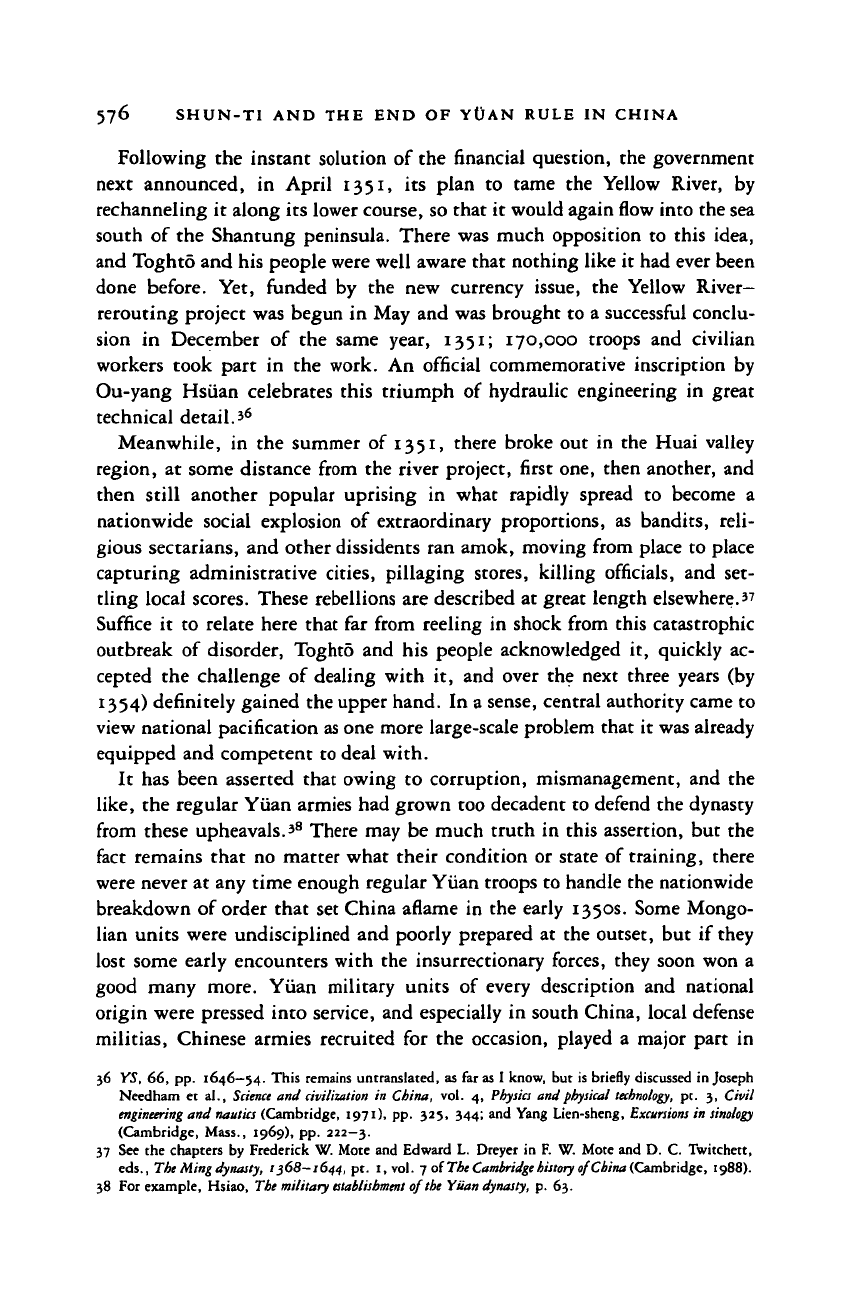
576 SHUN-TI AND THE END OF YUAN RULE IN CHINA
Following
the
instant solution
of
the financial question,
the
government
next announced,
in
April 1351,
its
plan
to
tame
the
Yellow River,
by
rechanneling
it
along its lower course, so that
it
would again
flow
into the sea
south
of
the Shantung peninsula. There was much opposition
to
this idea,
and Toghto and his people were well aware that nothing like
it
had ever been
done before.
Yet,
funded
by the new
currency issue,
the
Yellow River-
rerouting project was begun
in
May and was brought
to a
successful conclu-
sion
in
December
of the
same year,
1351;
170,000 troops
and
civilian
workers took part
in the
work.
An
official commemorative inscription
by
Ou-yang Hsiian celebrates this triumph
of
hydraulic engineering
in
great
technical detail.'
6
Meanwhile,
in the
summer
of
1351, there broke
out in the
Huai valley
region,
at
some distance from
the
river project, first one, then another,
and
then still another popular uprising
in
what rapidly spread
to
become
a
nationwide social explosion
of
extraordinary proportions,
as
bandits, reli-
gious sectarians,
and
other dissidents
ran
amok, moving from place
to
place
capturing administrative cities, pillaging stores, killing officials,
and set-
tling local scores. These rebellions are described
at
great length elsewhere.
37
Suffice
it to
relate here that
far
from reeling
in
shock from this catastrophic
outbreak
of
disorder, Toghto
and his
people acknowledged
it,
quickly
ac-
cepted
the
challenge
of
dealing with
it, and
over
the
next three years
(by
1354) definitely gained the upper hand.
In
a sense, central authority came
to
view national pacification
as
one more large-scale problem that
it
was already
equipped
and
competent to deal with.
It
has
been asserted that owing
to
corruption, mismanagement,
and the
like,
the
regular Yuan armies had grown too decadent
to
defend the dynasty
from these upheavals.3
8
There may
be
much truth
in
this assertion,
but the
fact remains that
no
matter what their condition
or
state
of
training, there
were never
at
any time enough regular Yuan troops
to
handle the nationwide
breakdown
of
order that set China aflame
in the
early 1350s. Some Mongo-
lian units were undisciplined
and
poorly prepared
at the
outset,
but if
they
lost some early encounters with
the
insurrectionary forces, they soon won
a
good many more. Yuan military units
of
every description
and
national
origin were pressed into service,
and
especially
in
south China, local defense
militias, Chinese armies recruited
for the
occasion, played
a
major part
in
36
YS, 66, pp.
1646-54. This remains untranslated,
as far
as
I
know,
but is
briefly discussed in Joseph
Needham
et al.,
Science
and
civilization
in
China,
vol. 4,
Physics
and
physical
technology,
pt. 3,
Civil
engineering
and
nautics (Cambridge, 1971),
pp. 323,
344;
and
Yang Lien-sheng,
Excursions
in
sinology
(Cambridge, Mass., 1969),
pp.
222—3.
37
See the
chapters
by
Frederick
W.
Mote
and
Edward
L.
Dreyer
in F. W.
Mote
and D. C.
Twitchett,
eds.,
The Ming dynasty, 1368—1644,
pt.
i.vol.
7
ofThe
Cambridge history
ofChina (Cambridge, 1988).
38
For
example, Hsiao,
The
military
establishment
of the Yiian dynasty,
p. 63.
Cambridge Histories Online © Cambridge University Press, 2008
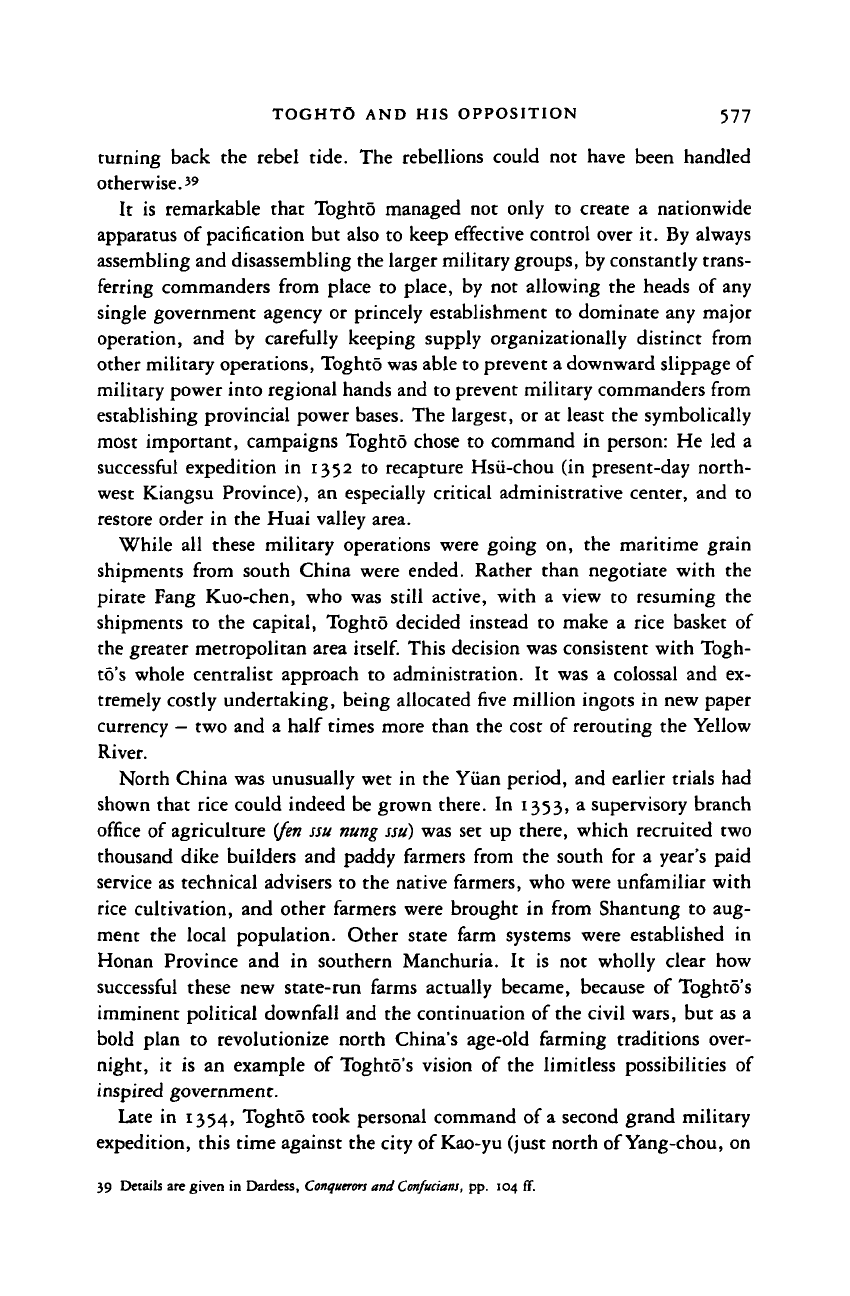
TOGHTO AND HIS OPPOSITION 577
turning back the rebel tide. The rebellions could not have been handled
otherwise.
39
It is remarkable that Toghto managed not only to create a nationwide
apparatus of pacification but also to keep effective control over it. By always
assembling and disassembling the larger military groups, by constantly trans-
ferring commanders from place to place, by not allowing the heads of any
single government agency or princely establishment to dominate any major
operation, and by carefully keeping supply organizationally distinct from
other military operations, Toghto was able to prevent a downward slippage of
military power into regional hands and to prevent military commanders from
establishing provincial power bases. The largest, or at least the symbolically
most important, campaigns Toghto chose to command in person: He led a
successful expedition in 1352 to recapture Hsii-chou (in present-day north-
west Kiangsu Province), an especially critical administrative center, and to
restore order in the Huai valley area.
While all these military operations were going on, the maritime grain
shipments from south China were ended. Rather than negotiate with the
pirate Fang Kuo-chen, who was still active, with a view to resuming the
shipments to the capital, Toghto decided instead to make a rice basket of
the greater metropolitan area
itself.
This decision was consistent with Togh-
to's whole centralist approach to administration. It was a colossal and ex-
tremely costly undertaking, being allocated five million ingots in new paper
currency
—
two and a half times more than the cost of rerouting the Yellow
River.
North China was unusually wet in the Yuan period, and earlier trials had
shown that rice could indeed be grown there. In 1353, a supervisory branch
office of agriculture (fen ssu nung
ssu)
was set up there, which recruited two
thousand dike builders and paddy farmers from the south for a year's paid
service as technical advisers to the native farmers, who were unfamiliar with
rice cultivation, and other farmers were brought in from Shantung to aug-
ment the local population. Other state farm systems were established in
Honan Province and in southern Manchuria. It is not wholly clear how
successful these new state-run farms actually became, because of Toghto's
imminent political downfall and the continuation of the civil wars, but as a
bold plan to revolutionize north China's age-old farming traditions over-
night, it is an example of Toghto's vision of the limitless possibilities of
inspired government.
Late in 1354, Toghto took personal command of a second grand military
expedition, this time against the city of Kao-yu (just north of Yang-chou, on
39 Details are given in Dardess, Conqutnn and
Confucians,
pp. 104 fT.
Cambridge Histories Online © Cambridge University Press, 2008
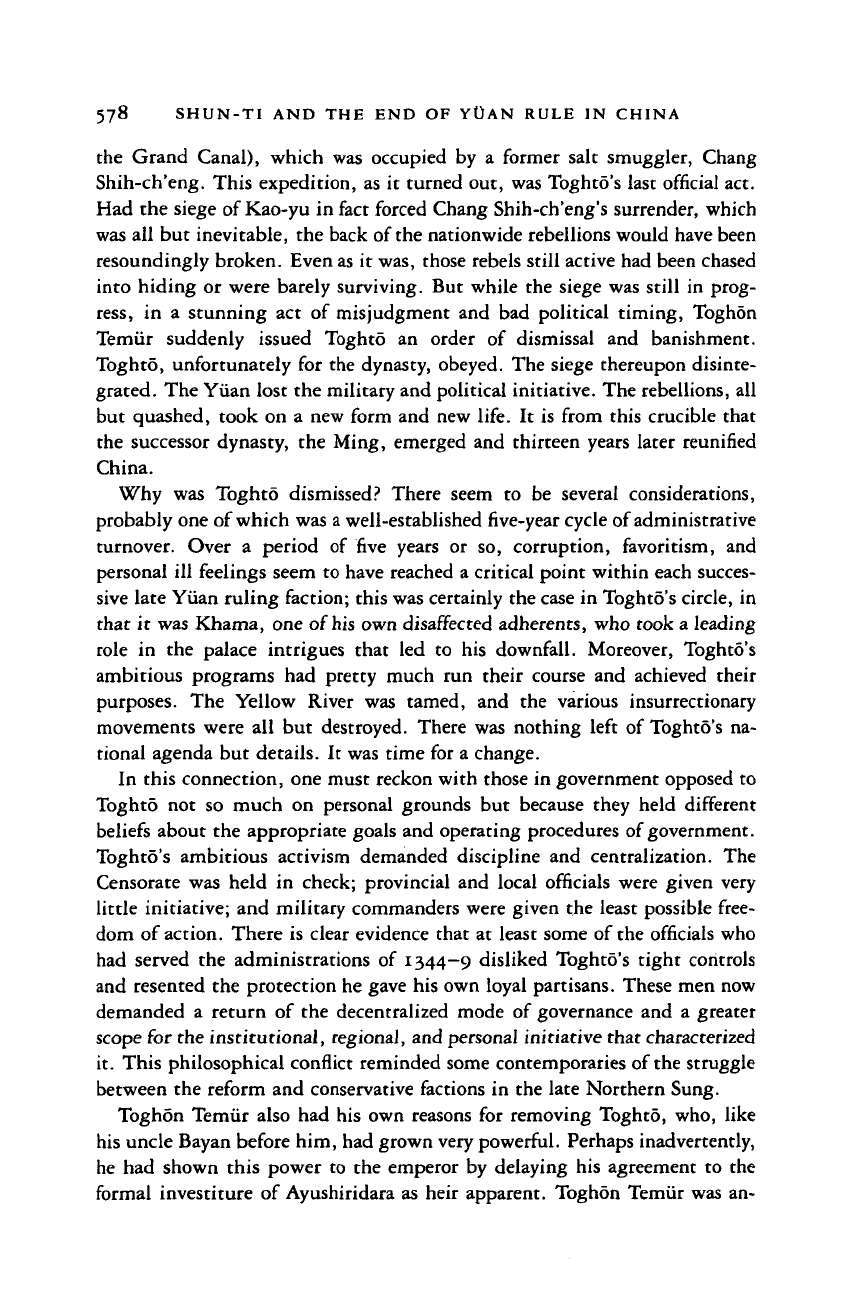
578 SHUN-TI AND THE END OF Yt)AN RULE IN CHINA
the Grand Canal), which was occupied by a former salt smuggler, Chang
Shih-ch'eng. This expedition, as it turned out, was Toghto's last official act.
Had the siege of Kao-yu in fact forced Chang Shih-ch'eng's surrender, which
was all but inevitable, the back of the nationwide rebellions would have been
resoundingly broken. Even
as
it was, those rebels still active had been chased
into hiding or were barely surviving. But while the siege was still in prog-
ress,
in a stunning act of misjudgment and bad political timing, Toghon
Temiir suddenly issued Toghto an order of dismissal and banishment.
Toghto, unfortunately for the dynasty, obeyed. The siege thereupon disinte-
grated. The Yuan lost the military and political initiative. The rebellions, all
but quashed, took on a new form and new life. It is from this crucible that
the successor dynasty, the Ming, emerged and thirteen years later reunified
China.
Why was Toghto dismissed? There seem to be several considerations,
probably one of which was
a
well-established
five-year
cycle of administrative
turnover. Over a period of five years or so, corruption, favoritism, and
personal ill feelings seem to have reached a critical point within each succes-
sive late Yuan ruling faction; this was certainly the case in Toghto's circle, in
that it was Khama, one of
his
own disaffected adherents, who took a leading
role in the palace intrigues that led to his downfall. Moreover, Toghto's
ambitious programs had pretty much run their course and achieved their
purposes. The Yellow River was tamed, and the various insurrectionary
movements were all but destroyed. There was nothing left of Toghto's na-
tional agenda but details. It was time for a change.
In this connection, one must reckon with those in government opposed to
Toghto not so much on personal grounds but because they held different
beliefs about the appropriate goals and operating procedures of government.
Toghto's ambitious activism demanded discipline and centralization. The
Censorate was held in check; provincial and local officials were given very
little initiative; and military commanders were given the least possible free-
dom of action. There is clear evidence that at least some of the officials who
had served the administrations of 1344-9 disliked Toghto's tight controls
and resented the protection he gave his own loyal partisans. These men now
demanded a return of the decentralized mode of governance and a greater
scope for the institutional, regional, and personal initiative that characterized
it. This philosophical conflict reminded some contemporaries of the struggle
between the reform and conservative factions in the late Northern Sung.
Togh5n Temiir also had his own reasons for removing Toghto, who, like
his uncle Bayan before him, had grown very powerful. Perhaps inadvertently,
he had shown this power to the emperor by delaying his agreement to the
formal investiture of Ayushiridara as heir apparent. Toghon Temiir was an-
Cambridge Histories Online © Cambridge University Press, 2008
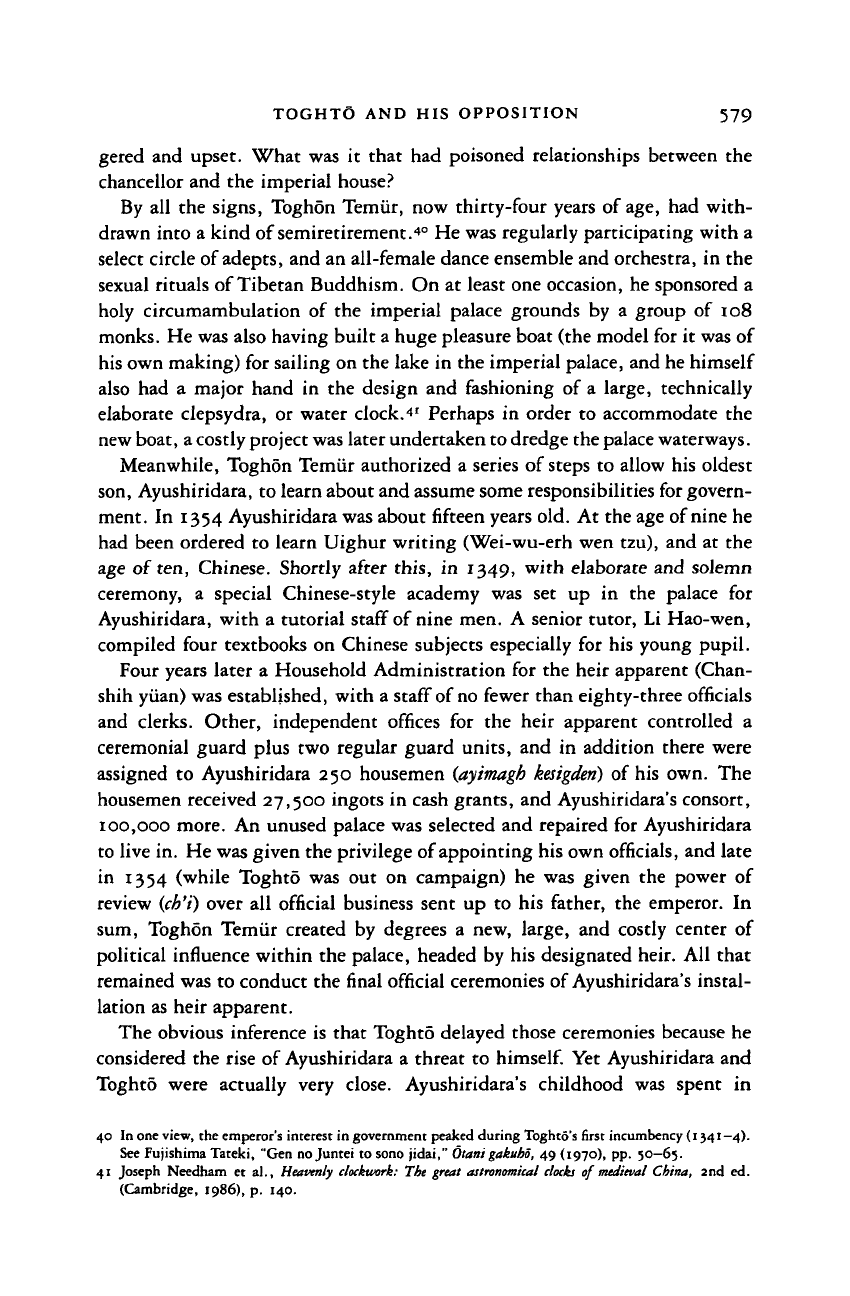
TOGHTO AND HIS OPPOSITION 579
gered and upset. What was it that had poisoned relationships between the
chancellor and the imperial house?
By all the signs, Toghon Temiir, now thirty-four years of age, had with-
drawn into a kind of semiretirement.
4
° He was regularly participating with a
select circle of adepts, and an all-female dance ensemble and orchestra, in the
sexual rituals of Tibetan Buddhism. On at least one occasion, he sponsored a
holy circumambulation of the imperial palace grounds by a group of 108
monks. He was also having built a huge pleasure boat (the model for it was of
his own making) for sailing on the lake in the imperial palace, and he himself
also had a major hand in the design and fashioning of a large, technically
elaborate clepsydra, or water clock.•»' Perhaps in order to accommodate the
new boat, a costly project was later undertaken to dredge the palace waterways.
Meanwhile, Toghon Temiir authorized a series of steps to allow his oldest
son, Ayushiridara, to learn about and assume some responsibilities for govern-
ment. In 1354 Ayushiridara was about fifteen years old. At the age of nine he
had been ordered to learn Uighur writing (Wei-wu-erh wen tzu), and at the
age often, Chinese. Shortly after this, in 1349, with elaborate and solemn
ceremony, a special Chinese-style academy was set up in the palace for
Ayushiridara, with a tutorial staff of nine men. A senior tutor, Li Hao-wen,
compiled four textbooks on Chinese subjects especially for his young pupil.
Four years later a Household Administration for the heir apparent (Chan-
shih yuan) was established, with a staff of no fewer than eighty-three officials
and clerks. Other, independent offices for the heir apparent controlled a
ceremonial guard plus two regular guard units, and in addition there were
assigned to Ayushiridara 250 housemen {ayimagh
kesigden)
of his own. The
housemen received 27,500 ingots in cash grants, and Ayushiridara's consort,
100,000 more. An unused palace was selected and repaired for Ayushiridara
to live in. He was given the privilege of appointing his own officials, and late
in 1354 (while Toghto was out on campaign) he was given the power of
review (ch'i) over all official business sent up to his father, the emperor. In
sum, Toghon Temiir created by degrees a new, large, and costly center of
political influence within the palace, headed by his designated heir. All that
remained was to conduct the final official ceremonies of Ayushiridara's instal-
lation as heir apparent.
The obvious inference is that Toghto delayed those ceremonies because he
considered the rise of Ayushiridara a threat to
himself.
Yet Ayushiridara and
Toghto were actually very close. Ayushiridara's childhood was spent in
40 In one view, the emperor's interest in government peaked during Toghto's first incumbency (1341
—4).
See Fujishima Tateki, "Gen no Juntei to sono jidai," Qtani
gakuho,
49 (1970), pp. 50—65.
41 Joseph Needham et al., Heavenly
clockwork:
The great astronomical
clocks
of
medieval
China, 2nd ed.
(Cambridge, 1986), p. 140.
Cambridge Histories Online © Cambridge University Press, 2008
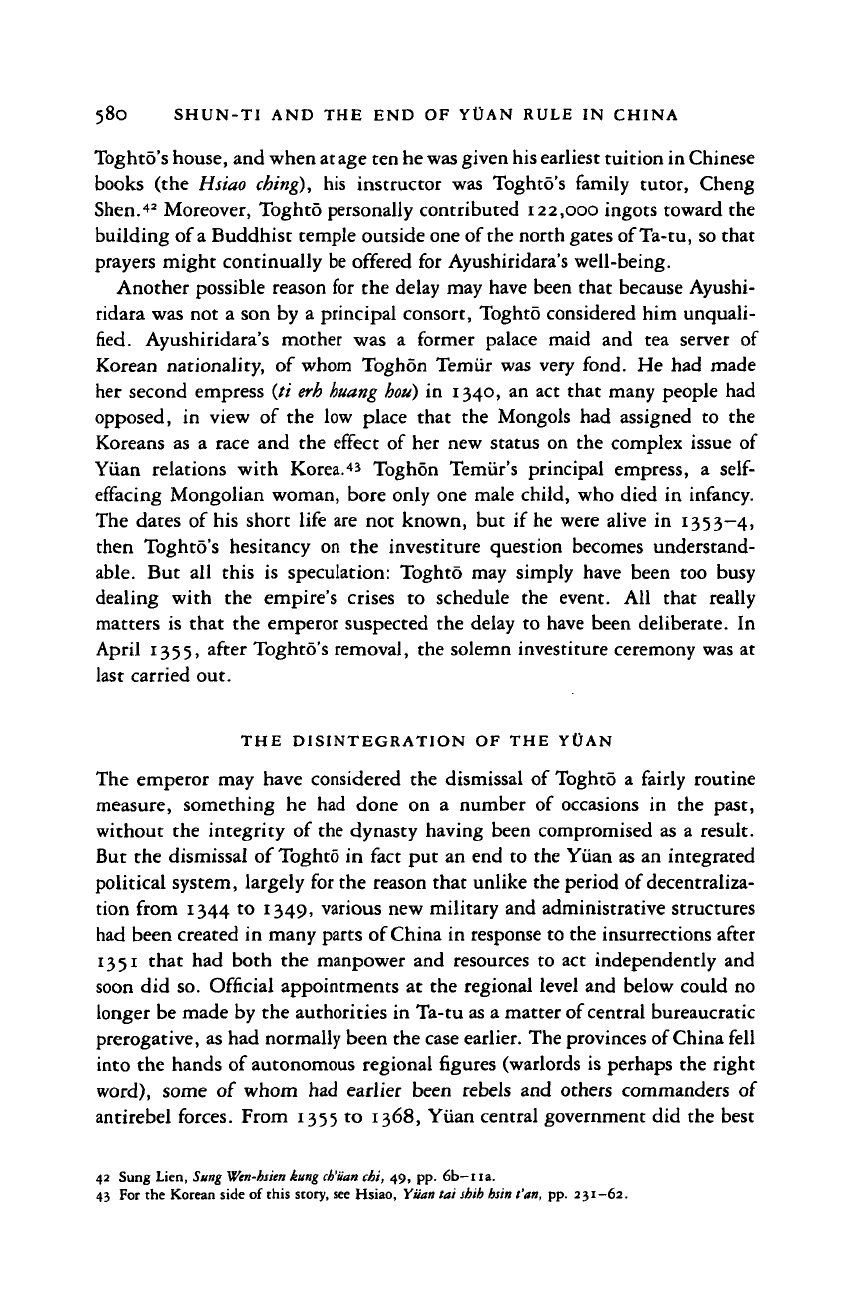
580 SHUN-TI AND THE END OF YUAN RULE IN CHINA
Toghto's house, and when
at age
ten he
was
given his earliest tuition in Chinese
books (the Hsiao ching), his instructor was Toghto's family tutor, Cheng
Shen.
42
Moreover, Toghto personally contributed 122,000 ingots toward the
building of a Buddhist temple outside one of
the
north gates of Ta-tu, so that
prayers might continually be offered for Ayushiridara's well-being.
Another possible reason for the delay may have been that because Ayushi-
ridara was not a son by a principal consort, Toghto considered him unquali-
fied. Ayushiridara's mother was a former palace maid and tea server of
Korean nationality, of whom Toghon Temiir was very fond. He had made
her second empress (//'
erh huang hou)
in 1340, an act that many people had
opposed, in view of the low place that the Mongols had assigned to the
Koreans as a race and the effect of her new status on the complex issue of
Yiian relations with Korea.
43
Toghon Temiir's principal empress, a
self-
effacing Mongolian woman, bore only one male child, who died in infancy.
The dates of his short life are not known, but if he were alive in 1353-4,
then Toghto's hesitancy on the investiture question becomes understand-
able.
But all this is speculation: Toghto may simply have been too busy
dealing with the empire's crises to schedule the event. All that really
matters is that the emperor suspected the delay to have been deliberate. In
April 1355, after Toghto's removal, the solemn investiture ceremony was at
last carried out.
THE DISINTEGRATION OF THE YUAN
The emperor may have considered the dismissal of Toghto a fairly routine
measure, something he had done on a number of occasions in the past,
without the integrity of the dynasty having been compromised as a result.
But the dismissal of Toghto in fact put an end to the Yiian as an integrated
political system, largely for the reason that unlike the period of decentraliza-
tion from 1344 to 1349, various new military and administrative structures
had been created in many parts of China in response to the insurrections after
1351 that had both the manpower and resources to act independently and
soon did so. Official appointments at the regional level and below could no
longer be made by the authorities in Ta-tu as a matter of central bureaucratic
prerogative, as had normally been the case earlier. The provinces of China fell
into the hands of autonomous regional figures (warlords is perhaps the right
word),
some of whom had earlier been rebels and others commanders of
antirebel forces. From 1355 to 1368, Yiian central government did the best
42 Sung Lien, Sung Wm-hsien kung ctiiian chi, 49, pp. 6b—1 la.
43 For the Korean side of this story, see Hsiao, Yiian tat shih hsin t'an, pp. 231-62.
Cambridge Histories Online © Cambridge University Press, 2008
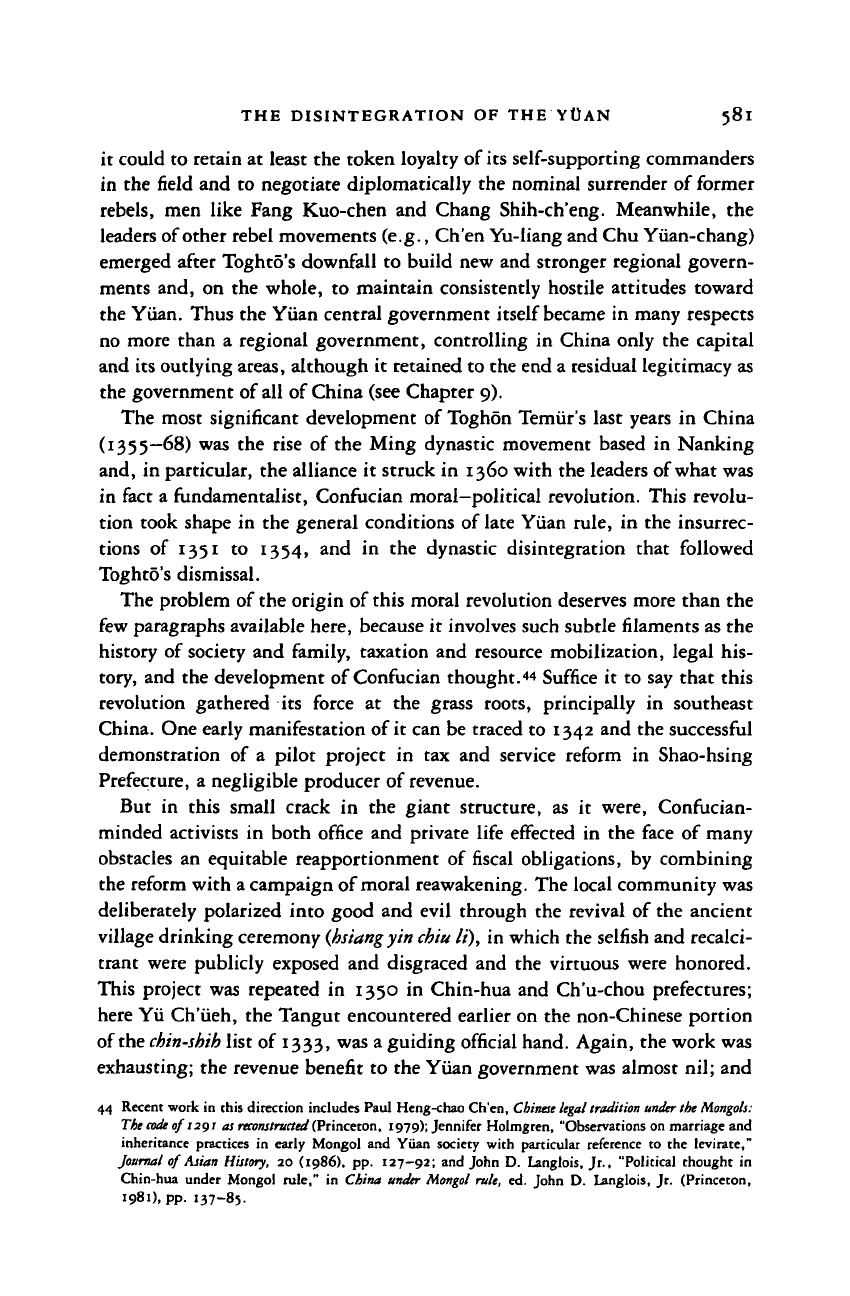
THE DISINTEGRATION OF THE YOAN 581
it could to retain at least the token loyalty of its self-supporting commanders
in the field and to negotiate diplomatically the nominal surrender of former
rebels, men like Fang Kuo-chen and Chang Shih-ch'eng. Meanwhile, the
leaders of other rebel movements (e.g., Ch'en Yu-liang and Chu Yuan-chang)
emerged after Toghto's downfall to build new and stronger regional govern-
ments and, on the whole, to maintain consistently hostile attitudes toward
the Yuan. Thus the Yuan central government itself
became
in many respects
no more than a regional government, controlling in China only the capital
and its outlying
areas,
although it retained to the end a residual legitimacy as
the government of all of China (see Chapter 9).
The most significant development of Toghon Temiir's last years in China
(1355-68) was the rise of the Ming dynastic movement based in Nanking
and, in particular, the alliance it struck in 1360 with the leaders of what was
in fact a fundamentalist, Confucian moral-political revolution. This revolu-
tion took shape in the general conditions of late Yuan rule, in the insurrec-
tions of 1351 to 1354, and in the dynastic disintegration that followed
Toghto's dismissal.
The problem of the origin of this moral revolution deserves more than the
few paragraphs available here, because it involves such subtle filaments as the
history of society and family, taxation and resource mobilization, legal his-
tory, and the development of Confucian thought.
44
Suffice it to say that this
revolution gathered its force at the grass roots, principally in southeast
China. One early manifestation of it can be traced to 1342 and the successful
demonstration of a pilot project in tax and service reform in Shao-hsing
Prefecture, a negligible producer of revenue.
But in this small crack in the giant structure, as it were, Confucian-
minded activists in both office and private life effected in the face of many
obstacles an equitable reapportionment of fiscal obligations, by combining
the reform with a campaign of moral reawakening. The local community was
deliberately polarized into good and evil through the revival of the ancient
village drinking ceremony
(hsiangyin chiu
It),
in which the selfish and recalci-
trant were publicly exposed and disgraced and the virtuous were honored.
This project was repeated in 1350 in Chin-hua and Ch'u-chou prefectures;
here Yii Ch'iieh, the Tangut encountered earlier on the non-Chinese portion
of the
chin-shih
list of
1333,
was a guiding official hand. Again, the work was
exhausting; the revenue benefit to the Yuan government was almost nil; and
44 Recent work in this direction includes Paul Heng-chao Ch'en, Chinee legal tradition
under
the
Mongols:
The
code
of 1291 as
reconstructed
(Princeton, 1979); Jennifer Holmgren, "Observations on marriage and
inheritance practices in early Mongol and Yuan society with particular reference to the levirate,"
Journal of Asian History, 20 (1986), pp. 127—92; and John D. Langlois, Jr., "Political thought in
Chin-hua under Mongol rule," in China under Mongol rule, ed. John D. Langlois, Jr. (Princeton,
1981),
pp. 137-85.
Cambridge Histories Online © Cambridge University Press, 2008
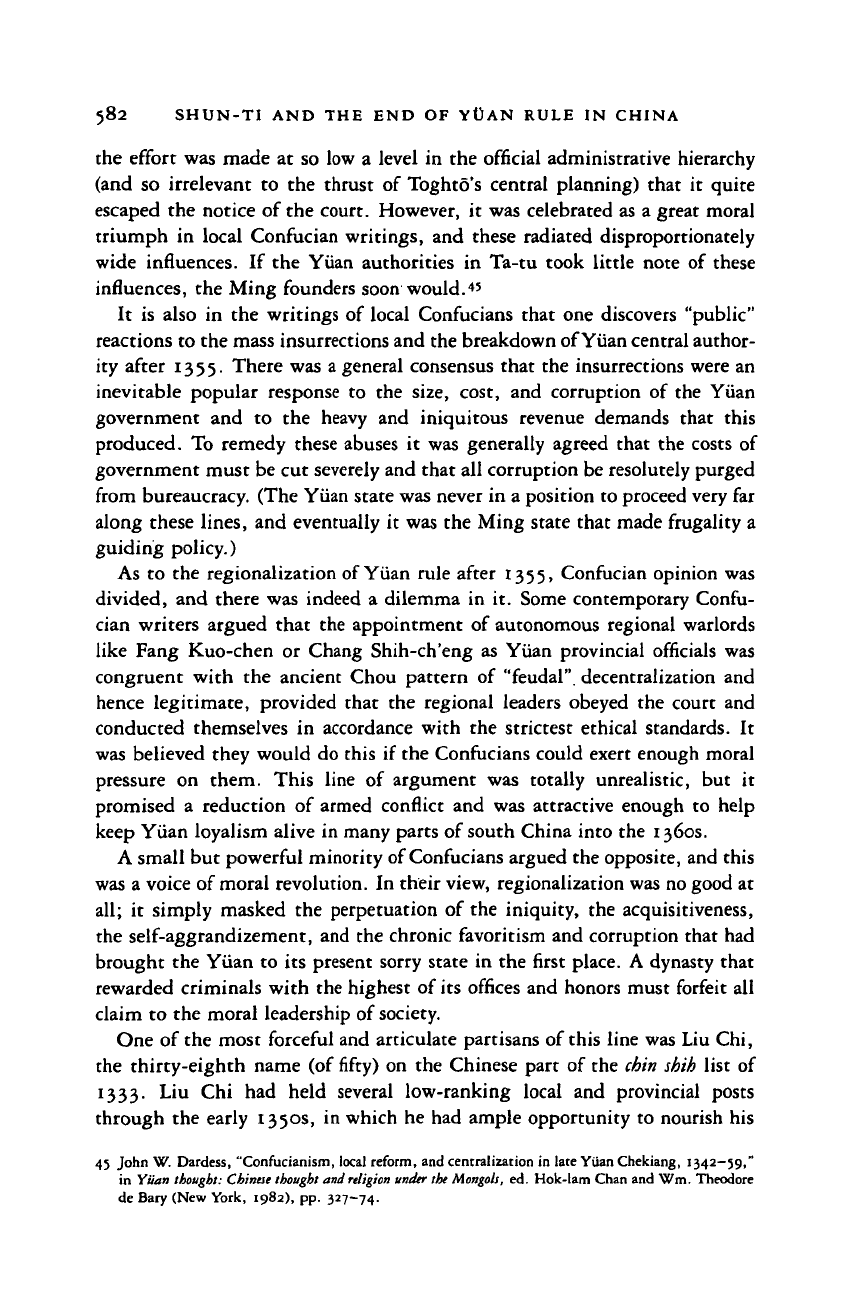
582 SHUN-TI AND THE END OF YUAN RULE IN CHINA
the effort was made at so low a level in the official administrative hierarchy
(and so irrelevant to the thrust of Toghto's central planning) that it quite
escaped the notice of the court. However, it was celebrated as a great moral
triumph in local Confucian writings, and these radiated disproportionately
wide influences. If the Yuan authorities in Ta-tu took little note of these
influences, the Ming founders soon would.
45
It is also in the writings of local Confucians that one discovers "public"
reactions to the mass insurrections and the breakdown of Yuan central author-
ity after 1355. There was a general consensus that the insurrections were an
inevitable popular response to the size, cost, and corruption of the Yuan
government and to the heavy and iniquitous revenue demands that this
produced. To remedy these abuses it was generally agreed that the costs of
government must be cut severely and that all corruption be resolutely purged
from bureaucracy. (The Yuan state was never in a position to proceed very far
along these lines, and eventually it was the Ming state that made frugality a
guiding policy.)
As to the regionalization of Yuan rule after 1355, Confucian opinion was
divided, and there was indeed a dilemma in it. Some contemporary Confu-
cian writers argued that the appointment of autonomous regional warlords
like Fang Kuo-chen or Chang Shih-ch'eng as Yuan provincial officials was
congruent with the ancient Chou pattern of "feudal", decentralization and
hence legitimate, provided that the regional leaders obeyed the court and
conducted themselves in accordance with the strictest ethical standards. It
was believed they would do this if the Confucians could exert enough moral
pressure on them. This line of argument was totally unrealistic, but it
promised a reduction of armed conflict and was attractive enough to help
keep Yuan loyalism alive in many parts of south China into the 1360s.
A small but powerful minority of Confucians argued the opposite, and this
was a voice of moral revolution. In their view, regionalization was no good at
all;
it simply masked the perpetuation of the iniquity, the acquisitiveness,
the self-aggrandizement, and the chronic favoritism and corruption that had
brought the Yuan to its present sorry state in the first place. A dynasty that
rewarded criminals with the highest of its offices and honors must forfeit all
claim to the moral leadership of society.
One of the most forceful and articulate partisans of this line was Liu Chi,
the thirty-eighth name (of fifty) on the Chinese part of the
chin shih
list of
1333.
Liu Chi had held several low-ranking local and provincial posts
through the early 1350s, in which he had ample opportunity to nourish his
43 John W. Dardess, "Confucianism, local reform, and centralization in late Yuan Chekiang, 1342-39,"
in Yuan thought: Chinese thought and
religion
under the Mongols, ed. Hok-lam Chan and Win, Theodore
de Bary (New York, 1982), pp. 327-74.
Cambridge Histories Online © Cambridge University Press, 2008
